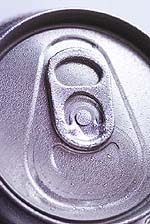Energy in a Pinch: The Facts on Energy Drinks

With highly suggestive names like Full Throttle, Monster, Red Bull, Rock Star or Amp, it's not surprising that energy drink market has hit a high, especially with teens and the college set. These bottled beverages are available at grocery stores, convenience stores, and even bars. But is the energy hype real? And more importantly, are these drinks safe? This article explores the energy drink phenomenon.
In 2005, energy drinks earned more than three billion dollars in retail sales in the United States alone. This figure is steadily climbing, and with the addition of many new drinks on the market each year, it is not likely to plateau soon. Yet, energy drinks are not quite so new to the world. Researchers point back to 1905 when Scotland produced a type of energy drink called Irn-Bru. Later in the century, Japanese businessmen were known to consume "genki drinks", which were thought to keep them alert during long hours or on the drive home.
In 1997, an Austrian company introduced Red Bull to U.S. consumers. Red Bull is adapted from a Thai drink called Krating Daeng, which is the drink of choice for rickshaw drivers there. Red Bull's infamous ingredient is not from a bull's semen or urine as reputed by urban legend, but rather, an amino acid, taurine, that was first discovered in bulls.
Energy drinks on the market today generally contain caffeine, B vitamins, and herbal ingredients; most contain sugar, but there are some sugar-free energy drinks available now. Look on any energy drink label and you are also likely to find other ingredients such as ginseng, guarana, taurine, maltodextrine, creatine, and ginkgo biloba as well as others. The average energy beverage contains roughly the same amount of caffeine as a cup of brewed coffee. But there are many new drinks on the market that are pushing the caffeine envelope to new heights. Red Bull contains as much caffeine as two cans of Coke or Pepsi. A new product made by Redux Beverages (called Cocaine) has three times the caffeine as a can of Red Bull.
Most people who consume energy drinks believe their energized effects are not hype. Caffeine, a well-known stimulant, does boost alertness and energy in the short term. However, regular and excessive caffeine use can result in headaches, jitteriness, upset stomach, and problems sleeping. People with a sensitivity to caffeine may experience anxiety or palpitations as well. Critics of energy drinks additionally point out the concerns about the combinations of the other ingredients, which have not been studied and worry about their effects on the body, particularly after exercise.
Researchers also warn that people should not confuse energy drinks with sports drinks like Gatorade. Gatorade and the like are made to help people stay hydrated during exercise or sports-related activities and to replace electrolytes and carbohydrates that are lost through sweat. Energy drinks actually promote dehydration due to high levels of caffeine.
In France, Red Bull has been banned for its role in a sports-related death. A young athlete died after drinking four cans of the beverage before playing a basketball game. Red Bull is also banned in Denmark. A British study concluded that the drink should not be consumed by pregnant women, and the U.S. is likely to place some restrictions on energy drink makers in the future.
Another potential problem for these energy drinks is their partnership with alcohol in bars and clubs. Drinks like Red Bull and vodka are favorites with young crowds who claim to like the stimulating effects of the cocktail. The problem, however, is that the energy drink masks the effects of alcohol. People may not feel tired or be aware of how much they are actually drinking, yet the energy drinks do not mask the blood's alcohol level. In fact, caffeine actually stalls the body's ability to metabolize the alcohol. Critics believe alcohol and energy drinks are an unsafe combination.
Nevertheless, if consumers heed advice and forego energy drinks during exercise and while consuming alcohol, they are not likely to experience negative side effects unless they over-indulge in the drinks. For instance, drinking several cans of the drinks over a couple days can lead to caffeine-withdrawal symptoms upon stopping their consumption for a day. Also, at a few bucks per can, energy drinks are not cheap to buy.
When consumed in moderation, energy drinks do appear to provide energy in a pinch. Although not as safe and healthful as an apple or whole-wheat bagel that provide longer-lasting energy, they appear to be on par with a cup of coffee or a can or two of soda. Consumer groups warn the targeted age group for these drinks (the 18 to 30 crowd) not to be swayed by savvy marketing schemes designed to sell these products. The drinks may, indeed, help in a pinch, but are not as healthful as natural food and drink alternatives.
|